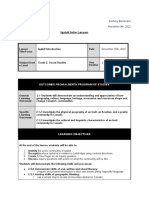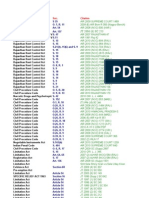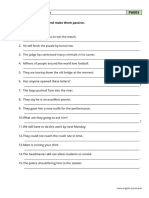0 ratings0% found this document useful (0 votes)
96 viewsBattle of Badr: Made By: Mustafa Arif Grade 9B
Battle of Badr: Made By: Mustafa Arif Grade 9B
Uploaded by
muzamil_raufThe Battle of Badr was fought between early Muslim followers of Muhammad and the Quraysh tribe of Mecca in 624 AD. The Muslims were outnumbered but were victorious due to divine intervention. Angels fought alongside the Muslims, helping to defeat the Quraysh army. The battle marked an important victory for the early Muslim community and established Muhammad's leadership.
Copyright:
Attribution Non-Commercial (BY-NC)
Available Formats
Download as PPTX, PDF, TXT or read online from Scribd
Battle of Badr: Made By: Mustafa Arif Grade 9B
Battle of Badr: Made By: Mustafa Arif Grade 9B
Uploaded by
muzamil_rauf0 ratings0% found this document useful (0 votes)
96 views27 pagesThe Battle of Badr was fought between early Muslim followers of Muhammad and the Quraysh tribe of Mecca in 624 AD. The Muslims were outnumbered but were victorious due to divine intervention. Angels fought alongside the Muslims, helping to defeat the Quraysh army. The battle marked an important victory for the early Muslim community and established Muhammad's leadership.
Original Title
Battle of Badr
Copyright
© Attribution Non-Commercial (BY-NC)
Available Formats
PPTX, PDF, TXT or read online from Scribd
Share this document
Did you find this document useful?
Is this content inappropriate?
The Battle of Badr was fought between early Muslim followers of Muhammad and the Quraysh tribe of Mecca in 624 AD. The Muslims were outnumbered but were victorious due to divine intervention. Angels fought alongside the Muslims, helping to defeat the Quraysh army. The battle marked an important victory for the early Muslim community and established Muhammad's leadership.
Copyright:
Attribution Non-Commercial (BY-NC)
Available Formats
Download as PPTX, PDF, TXT or read online from Scribd
Download as pptx, pdf, or txt
0 ratings0% found this document useful (0 votes)
96 views27 pagesBattle of Badr: Made By: Mustafa Arif Grade 9B
Battle of Badr: Made By: Mustafa Arif Grade 9B
Uploaded by
muzamil_raufThe Battle of Badr was fought between early Muslim followers of Muhammad and the Quraysh tribe of Mecca in 624 AD. The Muslims were outnumbered but were victorious due to divine intervention. Angels fought alongside the Muslims, helping to defeat the Quraysh army. The battle marked an important victory for the early Muslim community and established Muhammad's leadership.
Copyright:
Attribution Non-Commercial (BY-NC)
Available Formats
Download as PPTX, PDF, TXT or read online from Scribd
Download as pptx, pdf, or txt
You are on page 1of 27
Battle of Badr
Made by : Mustafa Arif
Grade 9B
Permission to Fight the Kuffar - The First Order of Jihad
• For 10 years, while in Makkah, the Muslims were prohibited to openly
fight the Kuffar because the disbelievers were greater in number and the
Muslims were very few.
• If the Muslims fought the disbelievers in Makkah, the results would have
been disastrous.
• When the disbelievers went to extremes in their transgression that they
forced Allah's Messenger (SAW) and his companions to leave the most
sacred place, resolved to kill the Prophet and sent threats to the Muslims
in al-Medina; Allah revealed verses of the Qur'aan giving permission to
the Muslims to fight the disbelievers.
• Now the Muslims had the support of the Ansaar, they had a place where
Islam prevailed and where they could retreat. It was an appropriate time
for Jihad.
• "Permission to fight is given to those (i.e. believers against those
disbelievers), who are fighting them, (and) because they (believers) have
been wronged, and surely Allah is Able to give them (believers)
victory." [(22): 39)]
Reason of the Battle of Badr
• While escaping from Makkah, the Muslims
were forced to leave behind all their wealth
and possession.
• The Prophet (SAW)saw this caravan as an
opportunity to get back some of their wealth.
• He (SAW) called for his companions and
marched towards the main road leading to
Makkah and turned towards Badr.
• His (SAW)intent was only to capture the
wealth and not war. But Allah, the Exalted, in
His Great Wisdom, willed for them to fight.
• On the other hand, Abu Sufyan knew that his route was not safe.
• He was further informed by his men about the Prophet's movement. He
immediately sent a man to Makkah asking for help.
• The man reached Makkah, cut off the nose and ears of the camel, turned
its saddle upside down, tore off his shirt from front and back (this was
their way of warning about enemies) and cried, 'O Quraysh! Your goods
are with Abu Sufyan. The caravan is being stopped by Muhammad (r) and
his companions. I cannot say what would have happened to them. Help!
Help!'
• The disbelievers shocked with the news rushed for Abu Sufyan's help.
They took with them a huge army of 1,300 well-equipped soldiers,
including 100 horsemen and a large number of camels to fight the
Muslims.
• Meanwhile, Abu Sufyan changed his route; he turned away from the main
road that passed near al-Medina towards Red Sea and thus was out of the
reach of the Muslims. When he found himself completely out of danger,
he again sent a messenger to the people of Makkah on their way,
informing them of his escape and asking them to return back.
• The Makkan army desired to return back.
• Abu Jahl, insisted to march up till Badr and said:
"No by Allah! We will not go back until we proceed
to the well of Badr, slaughter camels, drink liquor
and female singers sing for us.
• This way Arabs will always talk about our stance
and what we did on that day.“
• Now the disbelievers wanted to humiliate the
Muslims, punish them and prevent them from
stopping their caravans in the future.
• They marched towards Badr and encamped on the
bank of the valley.
Prophet and his
companions camped
at Badr near the
wells.
The well where
they camped
Badr
• Army of disbelievers
consisted of: 1000men ,700
camels and 300 horses.
• They were well trained
army with spears ,bows,
swords etc.
• Allah's Messenger (SAW) received revelation from Allah. It was not necessary
for him to consult with the Sahabah and seek their advice. But this practice of
Allah's Messenger (SAW) reflects a very import characteristic of the Muslim
leader, i.e. discussing and seeking advice of other knowledgeable Muslims. A
Muslim leader should not make decision merely based upon his opinion.
Rather, he should first consult with other knowledgeable Muslims, seek their
advice and then make appropriate decisions.
• The Muhajiroon (pl. of Muhajir) assured Allah's Messenger (SAW) that they
would fight along with him until the last breath. The first one to speak was
Abu Bakr (RA), then Umar Ibn al-Khattab (RA) and then al-Miqdad Ibn Amr
(RA) got up and said:"O Messenger of Allah! Proceed where Allah directs you
to, for we are with you. We will not say as the children of Israel said to Moosa
(AS), 'Go you and your Lord and fight and we will stay here.', Rather we shall
say, "Go you and your Lord and fight and we will fight along with you. By
Allah! If you were to take us to Bark al-Ghimad, we will still fight with
determination against its defender until you gained it."
• The Messenger of Allah (SAW) was pleased with the response of the
Muhajiroon but the Muhajiroon only consisted of a small portion of the army.
• In the morning, Allah Messenger (sallallahu alaihe wa-sallam) called
the Sahabah to offer the prayer and then positioned them for the battle.
• He (sallallahu alaihe wa-sallam) ordered them not to start fighting
unless he ordered them. On the other side, the Quraysh also prepared
for the war.
• When the two parties approached each other, Allah's Messenger
(sallallahu alaihe wa-sallam) supplicated to Allah saying: "O Allah!
The proud and arrogant Quraysh are already here disobeying you and
belying Your Messenger. O Allah! I am waiting for Your victory which
You have promised me. I beseech You Allah to defeat them (the
enemies).“
• Abu Jahl also prayed saying, "Our Lord, whichever of the two parties
was less kind to his relatives, and brought us what we do not know,
then destroy him tomorrow.' Allah says about this supplication of Abu
Jahl: "(O disbelievers) if you ask for a judgment, now has the
judgment come unto you [Soorah al-Anfal (8): 19]
Place where Prophet prayed.
Allah's Help
• Allah's Messenger (sallallahu alaihe wa-sallam) continuously prayed
to Allah day and night. When the battle became very crucial, he
(sallallahu alaihe wa-sallam) supplicate saying, "O Allah! Should
this group (of Muslims) be defeated today, You will no longer be
worshipped."
• He (sallallahu alaihe wa-sallam) stretched forth his hand and
supplicated to Allah until his cloak fell off his shoulders. Abu Bakr
(radhiallahu anhu) came up to him, picked his cloak, and put it back
on his shoulders and said: "O Prophet of Allah! You have cried out
enough to your Lord. He will surely fulfill what He has promised
you." [Saheeh al-Bukharee and an-Nasa'ee]
• Immediately, Allah responded to the supplication and sent Angels for
help, Allah says: "(Remember) when you sought help of your Lord
and He answered you saying, 'I will help you with a thousand
Angels each behind the other in succession." [Soorah al-Anfal (8):
9]
• The Messenger of Allah (sallallahu alaihe wa-sallam) raised his head and said
cheeringly: "O Abu Bakr, glad tidings are there for you; Allah's victory has
approached, by Allah I can see Jibreel on his mount in the thick of a
sandstorm." Then he recited the verse: "Their multitude will be put to
flight and they will show their backs." [Soorah al-Qamar (54): 45]
• Many narrations speak about the appearance of Angels in the battle of Badr. It is
mentioned in Saheeh Muslim that Ibn Abbas (radhiallahu anhu) said: "While on
that day a Muslim from the Ansaar was chasing a disbeliever, he heard over him
the swashing of a whip and the voice of the rider saying: 'Go ahead Haizum.' He
looked at the disbelievers who had fell on the ground on his back. The man
came to Allah's Messenger (sallallahu alaihe wa-sallam) and related the incident,
upon which Allah's Messenger (sallallahu alaihe wa-sallam) said: "You have told
the truth. This was the help from the third Heaven."
• Another incident is reported, where another man from the Ansaar captured
Abbas Ibn Abdul Mutalib, who said: "O Messenger of Allah! By Allah this man
did not capture me. I was captured by a man who was bald and had the most
handsome face, and who was riding a horse. I cannot see him here among the
people" The man from the Ansaar said: 'I captured him, O Messenger of Allah!'
The Prophet (sallallahu alaihe wa-sallam) replied: "Be quite, Allah, the All-
Might, strengthened you with the help of a noble Angel."
• Only after Allah affirmed that He will suffice, aid, support and
help the believers against their enemies, the Prophet (sallallahu
alaihe wa-sallam) gave clear order to counter attack the
disbelievers reciting the verse, "And be quick for forgiveness
from your Lord, and for Paradise as wide as are the Heavens
and the Earth." [Soorah aali-Imran (3): 133]
• Allah said: "O Prophet! Urge the believers to fight” The
Messenger of Allah (sallallahu alaihe wa-sallam) encouraged his
companions to fight. The courage and desire for Paradise and
willingness to fight the disbelievers that Allah's Messenger
(sallallahu alaihe wa-sallam) instilled in his companions is evident
from the actions of the Sahabah.
• Narrated Anas Ibn Malik (radhiallahu anhu), "…The polytheists
advanced (towards us), and the Messenger of Allah (sallallahu
alaihe wa-sallam) said: "Rise to enter Paradise which is equal in
width to the Heavens and the Earth."
• At the end of the battle, Abdullah Ibn Mas'oud, saw Abu Jahl
at the verge of death. He stepped on his neck and said: "Have
you seen how Allah has disgraced you?'
• But look how arrogant is this enemy of Allah, he replied to
Ibn Mas'oud saying: "I am not disgraced. I am no more than a
man killed by his own people on the battlefield." The
disbelievers were so terrified that they even left behind their
chief and fled the battlefield. When Ibn Mas'oud was about to
cut off his head, he said: "Cut off my head from near the
shoulders so that it looks bigger than the heads of all others
and it is seen as the head of the chief. Ibn Mas'oud cut off his
head and took it to Allah's Messenger (sallallahu alaihe wa-
sallam), who praised Allah upon seeing it. He (sallallahu
alaihe wa-sallam) later said when he saw his dead body: "This
is the Pharaoh of this nation."
• With the help of Allah, Allah's Messenger (sallallahu
alaihe wa-sallam) and his companions fought bravery
until the Quraysh suffered great loss and fled the
battlefield. They lost 70 of their best men and 70 were
taken as prisoners by the Muslims. Only fourteen
Muslims were martyred in this battle: "And
remember when you were few and were reckoned
weak in the land and were afraid that men might
kidnap you, but He provided a safe place for you,
strengthened you with His help, and provided you
with good things so that you might be
grateful." [Soorah al-Anfal (8): 26]
• After the battle of Badr, the Muslims emerged as one
powerful nation
Lessons from the Battle of Badr
• The Battle of Badr is a great example from our history that teaches; 'victory does not
depend on numbers or collecting weapons and shields - Victory is from Allah.'
• "How often has a small group overcome a might host by Allah's leave. And Allah
is with the patient." [Soorah al-Baqarah (2): 249]
• However, Allah only grants victory to those who believe in Him and put their
complete trust in Him. Allah sent blessing and help to the believers in the battle of
Badr and made them victorious over the disbelieving pagans only after putting them
to trial! Allah tested the Muslims for ten years in Makkah and then He tested them
again by the order to migrate to al-Medina leaving behind all possessions.
• It was the result of the strong trust of the Sahabah in Allah that they willingly
marched towards the battlefield, even though they knew that the disbelievers had
come with huge army and weaponry.
• It was their craving for Allah's Pleasure and Paradise that they proclaimed: "…We
will fight along with you. By Allah! If you were to take us to Bark al-Ghimad, we will
still fight with determination against its defender until you gained it." So after Allah
had tested them, He made them stand firm against their enemies, and granted them the
courage to fight them. It was only by the Help of Allah and His Blessings that the
Muslims could defeat the disbeliever who were three time greater in number and well-
equipped.
Thank you for watching
You might also like
- IQ EXAM NeuroDocument38 pagesIQ EXAM NeuroJaceee Q92% (12)
- Battle of BadrDocument8 pagesBattle of BadrFathimath HasmaNo ratings yet
- Chapter FiveDocument24 pagesChapter Fivemuhammad nafeelNo ratings yet
- Battle of BadrDocument8 pagesBattle of BadrFathimath Hasma100% (1)
- The Battle of BadrDocument5 pagesThe Battle of BadrMRB1968No ratings yet
- Battle of Ahzaab (Lessons & Morals)Document5 pagesBattle of Ahzaab (Lessons & Morals)mahdeeeeeeeeNo ratings yet
- Hazrat Abu Bakar Siddique (R.A)Document18 pagesHazrat Abu Bakar Siddique (R.A)Martin CooperNo ratings yet
- Battle of TrenchDocument17 pagesBattle of TrenchAbrar Ahmed QaziNo ratings yet
- The BATTLE OF BADR SummaryDocument3 pagesThe BATTLE OF BADR SummaryAllie KhalfeNo ratings yet
- Battle of BadrDocument75 pagesBattle of Badrmadarsa100% (1)
- Al Isra Wal MerajDocument19 pagesAl Isra Wal Merajtime21637No ratings yet
- Important informationPDF FULDocument6 pagesImportant informationPDF FULhajra9073No ratings yet
- Imam NawawiDocument892 pagesImam NawawiIrfan ArnavutiiNo ratings yet
- Battle of BadrDocument4 pagesBattle of BadrFasih UllahNo ratings yet
- Important informationDocument6 pagesImportant informationhajra9073No ratings yet
- Battle of Badr by Humeirah & ZainabDocument52 pagesBattle of Badr by Humeirah & ZainabPheonix WolfNo ratings yet
- Conquest of Khyber and Ja'Far's Return From HabashDocument25 pagesConquest of Khyber and Ja'Far's Return From HabashSaifNo ratings yet
- Abu-Bakr As-Siddeeq (The Man of Truth)Document3 pagesAbu-Bakr As-Siddeeq (The Man of Truth)bradia_03686330No ratings yet
- LIfe in Madinah (1-5)AHDocument8 pagesLIfe in Madinah (1-5)AHsyed.ali.ahmed2008No ratings yet
- Miracles of Prophet Muhammad (Peace Be Upon Him)Document58 pagesMiracles of Prophet Muhammad (Peace Be Upon Him)fahadkanuNo ratings yet
- The Greatest PersonalityDocument13 pagesThe Greatest PersonalityI Hq9zNo ratings yet
- Conquest of MakkahDocument6 pagesConquest of Makkahsana abbas50% (2)
- Abu Bakr SiddiqueDocument33 pagesAbu Bakr Siddiquemuhammad sohaibNo ratings yet
- Lack of Amr Bil M'rufDocument12 pagesLack of Amr Bil M'rufrightpath12100% (2)
- Ali Ibn Abi Talib The CaliphDocument19 pagesAli Ibn Abi Talib The Caliphmuhammad sohaibNo ratings yet
- Az-Zubayr Ibn Al-Awam: Companion of Prophet MuhammadDocument2 pagesAz-Zubayr Ibn Al-Awam: Companion of Prophet MuhammadT. ShuridNo ratings yet
- 04 5 Desperate Zindeeq - Brelvis (Notes) - AuthenticTauheed PublicationsDocument13 pages04 5 Desperate Zindeeq - Brelvis (Notes) - AuthenticTauheed PublicationsAuthenticTauheed PublicationsNo ratings yet
- Futuhu-Shaam (Victory of Syria)Document585 pagesFutuhu-Shaam (Victory of Syria)mario60045No ratings yet
- Imam Nawawi Prophetic QuotationsDocument294 pagesImam Nawawi Prophetic Quotationsweird johnNo ratings yet
- Sheikh Dr. Mahir Al-Maeqli 24/03/1438 (23/12/2016G)Document9 pagesSheikh Dr. Mahir Al-Maeqli 24/03/1438 (23/12/2016G)Muhammad Budiawanshah Ash-ShoidalyNo ratings yet
- Isl NotesDocument53 pagesIsl NotesZainab HassanNo ratings yet
- Persecutions and Difficulties in Makkah Prophet: (P.B.U.H)Document10 pagesPersecutions and Difficulties in Makkah Prophet: (P.B.U.H)Ibrahim SheikhNo ratings yet
- Sahih Bukhari Hadith Praises That Yazeed Yazid Bin Muawiyah Muawiya Will Go To Heaven ParadiseDocument12 pagesSahih Bukhari Hadith Praises That Yazeed Yazid Bin Muawiyah Muawiya Will Go To Heaven ParadiseRana Mazhar100% (1)
- The Battle of Uhud NotesDocument9 pagesThe Battle of Uhud NotesSifat ullah shah pakhtoonNo ratings yet
- Y10 WEEKLY OVERVIW T1 WK11 merged_compressedDocument32 pagesY10 WEEKLY OVERVIW T1 WK11 merged_compressedptbdebatesNo ratings yet
- ENGLISH - P5-b (New) - KARBLA's REAL Background in The Light of 50-Saheh-ul-Asnad SUNNI AHADITHsDocument10 pagesENGLISH - P5-b (New) - KARBLA's REAL Background in The Light of 50-Saheh-ul-Asnad SUNNI AHADITHsNadeem AnjumNo ratings yet
- The 18th of of The Year 10 (10 March 632 CE) .: Dhu'l-HijjahDocument29 pagesThe 18th of of The Year 10 (10 March 632 CE) .: Dhu'l-HijjahMoiz AtfsNo ratings yet
- Refrences Islamiyat 2058.0493Document12 pagesRefrences Islamiyat 2058.0493omarfarooq5151No ratings yet
- Lesson 97 Battle of UhudDocument63 pagesLesson 97 Battle of UhudNaimat UllahNo ratings yet
- The Agreed Upon Types of TawassulDocument4 pagesThe Agreed Upon Types of Tawassulzaki77No ratings yet
- Battle of Badr QsepDocument33 pagesBattle of Badr QsepNaeem Ibn Abdil WadoodNo ratings yet
- Week 03 Day 02 P1 October 2020Document4 pagesWeek 03 Day 02 P1 October 2020Riemn FarhanNo ratings yet
- Isra Miraj and PledgesDocument4 pagesIsra Miraj and Pledgesahmad jamalNo ratings yet
- The Battle of BadrDocument11 pagesThe Battle of BadrManzar KingNo ratings yet
- Badr, UhadDocument4 pagesBadr, UhadTeenage Girl100% (1)
- GhadeerDocument37 pagesGhadeerSalman Book CentreNo ratings yet
- A Vectorial Being: Between The Forerunners and The ContemporaryDocument18 pagesA Vectorial Being: Between The Forerunners and The Contemporaryabu firdawsNo ratings yet
- Week 03 Day 03 P1 2022Document3 pagesWeek 03 Day 03 P1 2022Malahim AliNo ratings yet
- The Battle of BadrDocument8 pagesThe Battle of BadrZeeshan Ul Haq100% (1)
- The Islamic Conquest of Syria 1ST Edition Imam Al-Waqidi 2024 Scribd DownloadDocument57 pagesThe Islamic Conquest of Syria 1ST Edition Imam Al-Waqidi 2024 Scribd Downloadtebekeseneja100% (1)
- The Four Rightly-Guided Caliphs of IslamDocument9 pagesThe Four Rightly-Guided Caliphs of Islammd dawnNo ratings yet
- En Abu Bakr As SiddiqDocument10 pagesEn Abu Bakr As SiddiqRafeek KhanNo ratings yet
- Usmanahmed 11 3756 1 Prophets Life 2Document40 pagesUsmanahmed 11 3756 1 Prophets Life 2Maaz harthy100% (1)
- The Quran With Tafsir Ibn Kathir Part 10 of 30: Al Anfal 041 To At Tauba 092From EverandThe Quran With Tafsir Ibn Kathir Part 10 of 30: Al Anfal 041 To At Tauba 092No ratings yet
- The Deviation of the Youth: Its Causes and the Means to Remedy ItFrom EverandThe Deviation of the Youth: Its Causes and the Means to Remedy ItRating: 5 out of 5 stars5/5 (5)
- 100 Hundred of The Greats of The Nation of Islam Who Changed The Course of HistoryFrom Everand100 Hundred of The Greats of The Nation of Islam Who Changed The Course of HistoryNo ratings yet
- Lesson Plan 1 - Grade 2 Social StudiesDocument4 pagesLesson Plan 1 - Grade 2 Social StudiesZachery SandersonNo ratings yet
- Chris Argyris ReportDocument11 pagesChris Argyris Reportapi-3778006100% (3)
- Microwave and Radar Engineering: Course Description and ObjectivesDocument3 pagesMicrowave and Radar Engineering: Course Description and ObjectivesAhzam ZobairiNo ratings yet
- Personal Statement ExamplesDocument6 pagesPersonal Statement Exampleslizochkaobama100% (2)
- Strengthening AML CFT Name Screening PracticesDocument25 pagesStrengthening AML CFT Name Screening PracticessimsiyangNo ratings yet
- Sas 11 Den 032Document12 pagesSas 11 Den 032Alexa De GuzmanNo ratings yet
- Gastrointestinal & NutritionBlock2 PDFDocument183 pagesGastrointestinal & NutritionBlock2 PDFTed DoyleNo ratings yet
- Lecture Notes - Evs Unit - 4Document13 pagesLecture Notes - Evs Unit - 4Nambi Rajan100% (2)
- Internship ReportDocument8 pagesInternship Reporteasy medicineNo ratings yet
- Bai Tap Word Form Lop 8 Co Dap AnDocument15 pagesBai Tap Word Form Lop 8 Co Dap AnltraNo ratings yet
- Rebbuting The Presumption of Mens ReaDocument5 pagesRebbuting The Presumption of Mens ReaMary JaneNo ratings yet
- MCBRIDE. Slavery As It Is Medicine and Slaves of The Plantation SouthDocument5 pagesMCBRIDE. Slavery As It Is Medicine and Slaves of The Plantation SouthRoarrrrNo ratings yet
- Computer System Expansion SlotsDocument5 pagesComputer System Expansion SlotsMary Millare100% (1)
- Buzzy Bees: Age Category TopicDocument15 pagesBuzzy Bees: Age Category TopicArvin EfrianiNo ratings yet
- KTP2024-2025 English Plus 9 SalikhaDocument14 pagesKTP2024-2025 English Plus 9 Salikhabodik87No ratings yet
- Mechanistic Empirical - PPT Compatibility MDocument33 pagesMechanistic Empirical - PPT Compatibility MKhin Khin ThawNo ratings yet
- 7.1 American Cuisine Main CurseDocument35 pages7.1 American Cuisine Main CurseLiza BanoNo ratings yet
- EXERCISE TWO Primary and Secondary SourceDocument2 pagesEXERCISE TWO Primary and Secondary SourceJomar Callada CascabelNo ratings yet
- Rajesh Kumar ResumeDocument2 pagesRajesh Kumar ResumeRajeshNo ratings yet
- Smoke Social Media Infographics by SlidesgoDocument35 pagesSmoke Social Media Infographics by SlidesgoAvinash RishiNo ratings yet
- Ranga'S Marriage: Masti Venkatesh IyengarDocument2 pagesRanga'S Marriage: Masti Venkatesh Iyengar3161 Mahir FadteNo ratings yet
- Sanborn Response WilliamsonDocument8 pagesSanborn Response WilliamsonAnonymous HtDbszqtNo ratings yet
- Cbydp 2024-2026Document7 pagesCbydp 2024-2026Bench Nool Bermudo100% (5)
- (VigChr Supp 110) Petri Luomanen - Recovering Jewish-Christian Sects and Gospels, 2012 PDFDocument311 pages(VigChr Supp 110) Petri Luomanen - Recovering Jewish-Christian Sects and Gospels, 2012 PDFNovi Testamenti Filius100% (1)
- Reso Guide (2011-12)Document48 pagesReso Guide (2011-12)Resonance Kota0% (1)
- MEDICAL SURGICAL NURSING Cardiovascular and Respiratory SystemDocument12 pagesMEDICAL SURGICAL NURSING Cardiovascular and Respiratory Systemvalentine95% (20)
- Important Case LawDocument130 pagesImportant Case LawRakesh Shekhawat89% (9)
- B1 Passive Voice PA003: Rewrite The Sentences and Make Them PassiveDocument2 pagesB1 Passive Voice PA003: Rewrite The Sentences and Make Them PassiveOtilia IoanaNo ratings yet
- Liberty Union Vs Liberty CottonDocument2 pagesLiberty Union Vs Liberty Cottonrubbtuna100% (1)

























































































